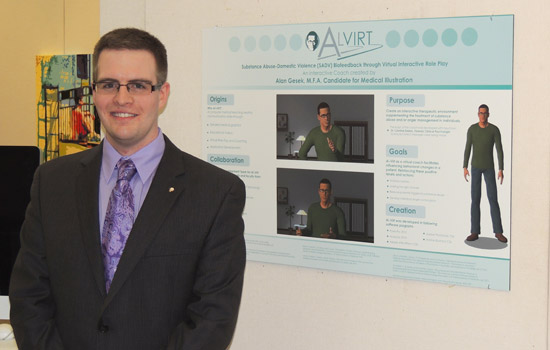What is your face saying to others?
Digital ‘coach’ designed for individuals undergoing treatment for substance abuse, aggressive behavior
Al-Virt is a digital life coach that Alan Gesek ’11 (BFA, illustration) designed as part of an interactive therapeutic tool to teach healthy communication and conflict resolution skills. Gesek, a graduate student in the medical illustration program, showed his work on Al-Virt during the MFA thesis exhibit on March 29.
Imagine RIT festivalgoers will be introduced to the new face of interactive therapy. “Al-Virt,” is a digital coach programmed for the festival with anti-bullying messages for children visiting the Gordon Field House on May 4 and the booth, “What is Your Face Saying to Others?”
Al-Virt’s message was tweaked for the festival by developer Alan Gesek, a graduate student in the medical illustration program from Lebanon, N.H. The digital “coach” is part of an extensive web application designed for individuals undergoing treatment for substance abuse and aggressive behavior. Al-Virt normally shares messages regarding reducing substance abuse and violent behavior.
“I reworked a few videos so the message was on bullying: ‘Walk away from the bully; seek a guidance counselor; seek advice from a parent, coach or guidance counselor,’ ” Gesek says. “We will be giving away flash drives to children with educational content on bullying that we made and also flash drives to adults about substance abuse.
“I’ve never exhibited at Imagine RIT,” Gesek adds. “To be part of it is one of the things that is capping off my time at RIT.”
Gesek developed the interactive coach and the subject of his MFA thesis during a yearlong collaboration with faculty and students from the College of Health Sciences and Technology, the College of Imaging arts and Sciences and the B. Thomas Golisano College of Computing and information Sciences.
“It’s been so collaborative—the School of Film and Animation, medical illustration, medical informatics, forensic psychology—all these different avenues of education you wouldn’t expect to come together, but which work so well in terms of the faculty and students,” Gesek says. “Everyone did a piece.”
Caroline Easton, RIT professor of forensic clinical psychology in the College of Health Sciences and Technology, says RIT’s students are at the forefront in a trend to adapt gaming technology to mental and behavioral health therapy.
“Human visualization and cyber tools, I think, are the future in medical sciences in terms of treatment and education,” Easton says. “RIT students are doing it now.”
The exhibit will display Al-Virt’s potential as an avatar life coach and other components of the larger interactive application collectively called “Al-Virt.” The therapeutic tool supports the model of care Easton developed for treating people with substance abuse and aggression problems.
Easton’s clients will interact with Al-Virt to reinforce healthy communication skills they learn in therapy. The digital coach acts a guide through the web application, leading the client to educational videos about the effect of alcohol on the body. Valerie Altounian, a graduating senior in medical illustration from Troy, N.Y., Tim Fitzgerald from Acworth, Ga., and Nirja Desai from Allentown, Pa., both graduate students in the masters medical illustration program, made the educational videos and helped design the interface for realistic vignettes teaching conflict resolution and positive role modeling.
Graduate student Teraisa Chloros, a resident of Webster, N.Y., designed the web application for her capstone project in the master’s program in medical informatics and acted as the project manager and liaison throughout the effort. She will offer demonstrations of the web application and the interactive Noldus FaceReader software that recognize facial expressions and which gives Al-Virt his “emotional intelligence.”
Faculty participating in the exhibit also includes Richard Doolittle, vice dean of the College of Health Sciences and Technology, Glen Hintz and Jim Perkins, chairs of the medical illustration program, with joint appointments in the College of Imaging Arts and Sciences and the College of Health Sciences and Technology, and Shaun Foster, associate professor of computer graphics in the College of Imaging Arts and Sciences.









